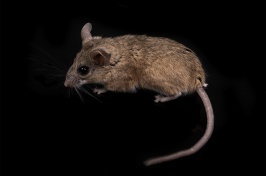Molecular, Cellular, and Biomedical Sciences
UNH Student Awarded Prestigious Graduate Fellowship
UNH undergraduate student Leandra Bryant ’25 has received the prestigious Graduate Research Fellowship (GRFP) from the National Science Foundation. Awarded to students pursuing master’s and doctoral degrees in science, technology, engineering and mathematics, the five-year fellowship includes three... Read More-
10/18/24
Synthetic Microbiomes: Building Plant Defenses for a Changing Climate
UNH researchers explore how synthetic microbiomes can help plants like duckweed adapt to climate change, boosting resilience and aiding in... -
06/19/24
Microplastics in Estuaries
Estuaries in New England are crucial for wildlife and aquaculture, but microplastics pose a growing threat. UNH researchers are studying microplastic... -
06/17/24
Aquatic Plants Could Help Reduce Water Pollution
Tiny aquatic plants called duckweed and their microbes could be engineered to cleanse chemicals from runoff water. Anna O'Brien's research at UNH... -
05/23/24
Desert Mice Offer Insight into Potential Climate Change Adaptations
UNH researchers study cactus mice adaptations to arid conditions, uncovering strategies to help animals and humans survive in a rapidly warming,...
Recent Stories
-
05/01/24 - COLSA Faculty Spotlight: Anna O’BrienDiscover how COLSA Assistant Professor Anna O’Brien combines her love of plants, microbiomes, and sustainability to address the effects of climate change on agriculture. Read More
-
06/21/23 - 1 out of 4 Americans likely have Toxoplasmosis. What’s Toxoplasmosis?COLSA research examines the role that a part of the parasite Toxoplasma gondii plays in switching on and off the genes responsible for regulating infections caused by the parasite... Read More
-
05/08/23 - Six Students, Alumni Receive NSF Graduate Research FellowshipsThree UNH students and three alumni received National Science Foundation Graduate Research Fellowships, a record number for UNH. Read More
-
12/06/22 - Predicting Eye DiseaseA recently awarded $1.5 million grant from the U.S. National Institutes of Health’s (NIH) National Eye Institute will support ongoing research into retinal degenerative diseases... Read More
-
07/27/22 - Download the NHAES 2022 Inspired Horticultural Research Report today!The latest edition of the NH Agricultural Experiment Station’s Inspired magazine and research report is here! The latest edition explores station research into horticulture... Read More
-
07/15/22 - Measuring Methane in StreamsDifferent aquatic bodies play different roles in the release of methane gas. Wetlands, lakes, and reservoirs all play large roles in releasing methane directly into the atmosphere... Read More
-
07/13/22 - Sequencing VariantsWith new funding from the National Institutes of Health, UNH wilil continue its genomic surveillance of COVID-19 variants in New Hampshire. Read More
-
06/21/22 - Repurposing Drug Compound Could Slow COVID SpreadKrisztina Varga, associate Professor of Molecular, cellular and Biomedical Sciences. Photo by Jeremy Gasowski. With the end of the pandemic seemingly nowhere in sight,... Read More
-
05/17/22 - Innovation InspirationUNHInnovation honored its Innovators of the Year for 2020 and 2021. Read More
-
04/12/22 - Genomic Time MachineLooking at the microbiome of sponges, UNH researchers have developed a “genomic time machine” that could predict aspects of coral reef and ocean ecosystems through hundreds of... Read More
































































